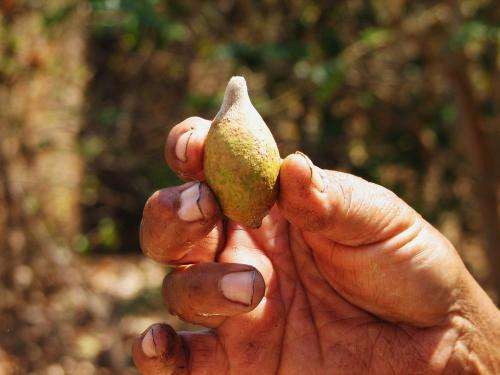Native plum likely new weapon against Alzheimer's

West Australian researchers are confident the native Australian fruit Kakadu plum could provide the most powerful antioxidant treatment yet in combating Alzheimer's disease.
Chair of Edith Cowan University's Foundation of Ageing and Alzheimer's Disease, Ralph Martins says early indications are the Kakadu plum could have antioxidant properties up to seven-times greater than curcumin—the chemical compound in turmeric currently in clinical trials as an Alzheimer's treatment.
The Kakadu plum (Terminalia ferdinandiana) grows wild in the Northern Territory and Western Australia where it is used as a traditional food and medicine by Indigenous people.
Professor Martins says while curcumin is a very powerful antioxidant, the Kakadu plum's 'protective ability' makes it potentially much more powerful.
"When the plant's environment is very harsh they have to produce powerful antioxidants to protect themselves and I think that's what's happening with the Kakadu plum so I am very, very excited," he says.
"Because it's a natural compound it could get to clinical trial faster but what we have to do first is see in the laboratory if it can protect brain neurons from toxic agents—the one in Alzheimer's is beta-amyloid, which kills brain cells.
"That would give us confidence that it's an attractive candidate for further trials."
He says trials could start as early as mid-2015 if funding can be secured.
It is estimated that by 2050 three million Australians will have a form of dementia with Aboriginal people among those most at risk.
Prof Martins says while Kakadu plums are currently grown in remote locations they could be cultivated more widely for medical purposes.
He applauded former WA Chief Scientist Lyn Beazley for linking him to a project spearheaded by UWA's Dr Liz Barbour which has provided him with fruit samples for his research.
Dr Barbour's project aims to develop the Kakadu plum tree as a commercial crop to boost Indigenous communities.
She says the health benefits from the fruit's high vitamin C and antioxidant capabilities have already attracted international attention to the project.
"Health-market demand for natural vitamin C and antioxidants is creating a market for Kakadu plum fruit that is a challenge to support reliably from wild harvest," Dr Barbour says.
The UWA project focuses on supplementing existing trees with enrichment plantings in rows rather than orchards.
Dr Barbour says research in 2011 which compared four native Australian fruits found the Kakadu plum had strong cytoprotective properties and the greatest antioxidant activity through several mechanisms including free radical scavenging.
More information: "Aaron C. Tan, Izabela Konczak, Iqbal Ramzan, Daniel M.-Y. Sze, Antioxidant and cytoprotective activities of native Australian fruit polyphenols," Food Research International, Volume 44, Issue 7, August 2011, Pages 2034-2040, ISSN 0963-9969, dx.doi.org/10.1016/j.foodres.2010.10.023.



















